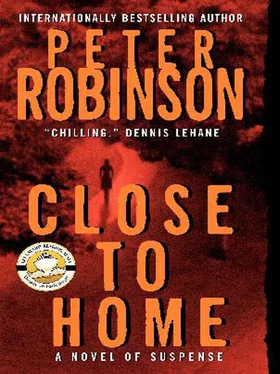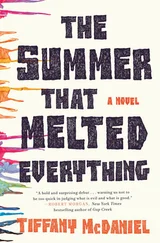“But your Joey was never found?”
“No. He had no defenses. He must have thought he was home free, but he couldn’t survive all the predators out there. He was in way over his plumage. Look,” Banks went on, “will you answer a question for me?”
Michelle nodded but looked wary and shuffled in her seat.
“Are you married?” Banks asked.
“No,” she said. “No, I’m not.” And she got up and walked out without even saying good-bye.
Banks was about to go after her when his mobile rang. Cursing, and feeling like a bit of a pillock, the way he always did when it went off in a public place, Banks answered the call.
“Alan? It’s Annie. Hope I haven’t called at a bad time.”
“No, not at all.”
“Only we could use a bit of extra help, if you’ve finished your business down there.”
“Pretty much,” said Banks, thinking that his partings with both members of the local constabulary he had met left a lot to be desired. “What’s up?”
“Know that missing kid I told you about?”
“Luke Armitage?”
“That’s the one.”
“What about him?”
“It looks as if it’s just turned into a murder case.”
“Shit,” said Banks. “I’m on my way.”
“Strictly speaking, you know,” said Banks, “this is your case. It has been from the start. Are you sure you want me muscling in?”
“I wouldn’t have rung you if I didn’t, would I?” said Annie. “Besides, you know I’m not that kind of copper.”
“What kind of copper?”
“All territorial and bureaucratic. I don’t go in for pissing matches. I’m all for cooperation, me, not competition.”
“Fair enough. Let’s chalk my comment down to recent experience.”
“What do you mean?”
Banks told her about Detective Superintendent Shaw.
“Well,” Annie said. “Don’t say I didn’t warn you they wouldn’t exactly welcome you with open arms.”
“Thanks.”
“My pleasure. Anyway, you can help me just as long as you give me the respect I deserve and don’t treat me like a skivvy.”
“Have I ever?”
“This is a pretty good start.”
Banks’s car was in the garage for servicing and wouldn’t be ready until after lunch, so they had signed out a department car that morning, and Annie was driving, something Banks usually liked to do himself.
“I was thinking I could sort of get to like it,” said Banks. “There’s a lot to be said for having a chauffeuse .”
Annie shot him a look. “Feel like getting out and walking the rest of the way?”
“No, thanks.”
“Well, behave yourself. Anyway,” she went on, “if you want to be all official about it, it’s the Big Man’s case. He’s the SIO, and he’s the one who suggested if I asked you nicely you might come back from leave early and give us the benefit of your considerable expertise.”
“The Big Man?”
“Detective Superintendent Gristhorpe.”
“Does he know you call him that?”
Annie grinned. “You should hear what we call you in the squad room.”
“I must say it’s great to be home,” said Banks.
Annie glanced sideways at him. “How did things go, other than your run-in with the local constabulary?”
“All a bit embarrassing, really.” Banks told her about McCallum turning out to be an escaped mental patient who drowned before Graham disappeared.
“I’m so sorry, Alan,” she said, touching his knee. “After all those years feeling guilty and responsible… But you must be relieved, in a way… I mean, knowing it couldn’t have been him, so it wasn’t your fault?”
“I suppose I must. You know, apart from the police down there, you’re the only other person I’ve ever told about what happened by the river that day.”
“You never told Sandra?”
“No.”
“Why?”
“I don’t know.”
Banks felt Annie retreat into silence beside him and knew he’d done again exactly the sort of thing that caused her to end their romantic relationship. It was as if she offered him something warm, soft and sensitive, yet the moment he reached out and touched it, she shot back into her hard, impenetrable shell.
Before either of them could think of anything else to say, they arrived at the end of the Armitages’ drive, where reporters clamored around them with pens, microphones and cameras. The officer on duty lifted the tape and let them through.
“Impressive,” said Banks, when the building’s solid, symmetrical architecture came into view. “I’ve only seen the place from the riverside walk before.”
“Just wait until you meet the beautiful people inside.”
“Go easy, Annie, they’ve just lost their son.”
Annie sighed. “I know that. And I will. Okay?”
“Okay.”
“I’m just not looking forward to this.”
“Who dealt with the identification?”
“Winsome did. Last night.”
“So you haven’t seen the family since the boy’s body was found?”
“No.”
“If you don’t think I’m being patronizing, why don’t you let me deal with them?”
“Be my guest. Honest. Given my track record with Martin Armitage, I’d be grateful to be an observer this time. Fresh approach and all that.”
“Okay.”
Josie answered the front door almost the moment they rang the bell and led the two of them into the living room, where Banks introduced himself.
“What is it now?” Martin Armitage asked, glaring at Annie. Neither he nor his wife looked as if they had had much sleep, and they probably hadn’t.
“A murder investigation,” said Banks. “Or so it seems. And we need your help.”
“I don’t see how we can help any more than we have done already. We cooperated with you, against the kidnapper’s wishes, and look what happened.” He glanced toward Annie again, voice rising. “I hope you realize this is your fault, that Luke’s death is your responsibility. If you hadn’t followed me to the shelter and then come nosing around here, the kidnapper would have picked up the money and Luke would be home safe and sound.”
“Martin,” said Robin Armitage. “We’ve been over this again and again. Don’t make a scene.”
“Don’t make a scene! Good God, woman, this is your son we’re talking about. She as good as killed him.”
“Calm down, Mr. Armitage,” said Banks. Martin Armitage wasn’t quite as tall as Banks had imagined, but he was fit and bursting with energy. Not the kind of man to sit around waiting for results, but one who went out and made the result happen. That was the way he’d played football, too, Banks remembered. Armitage hadn’t been content to hang around the goalmouth waiting for a midfielder to feed him the ball; he had created scoring opportunities himself, and the main criticism leveled at him was that he was greedy for the ball, more apt to shoot and miss than pass to someone in a better scoring position. He had also lacked self-control and attracted a high number of red and yellow cards. Banks remembered once seeing him lash out at a member of the other team who had taken the ball from him fairly in the penalty area. He’d given away a penalty over that, and it lost his side the game.
“This is a difficult enough job as it is,” said Banks, “without you making it worse. I’m sorry for your loss, but it’s no good flinging blame about. We don’t know how or why Luke died yet. We don’t even know where or when. So until we’ve been able to answer some of those basic questions we’re not in a position to jump to conclusions. I suggest you exercise the same restraint.”
“What else would you say?” said Martin. “You always stick together, you lot.”
Читать дальше












